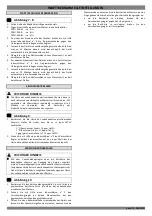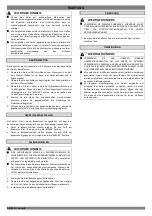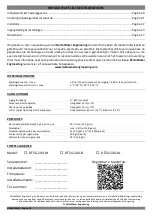
START-UP & SETTINGS
Page 5 - ENGLISH
START-UP / MANUAL REGENERATION
⊷
Illustration 7 - 8
1.
Fill the brine cabinet with regeneration salt.
2.
Using a bucket, add water to the brine cabinet :
DTSO-200-M : approx. 4 ltr
DTSO-200-B
: approx. 6 ltr
DTSO-200-BL : approx. 6 ltr
3.
On one of the control valves of the device, using a hex key n° 5,
turn the program disc counter clockwise until the regeneration
starts.
4.
Allow the device to perform a full regeneration, which will take
approx. 15 min; afterwards, the device will automatically return
to the service position.
5.
Check the drain hose from the control valve; there should not be
any water flow.
6.
On the other control valve of the device, using a hex key n° 5, turn
the program disc counter clockwise until the regeneration starts.
7.
Allow the device to perform a full regeneration, which will take
approx. 15 min; afterwards, the device will automatically return
to the service position.
8.
Check the drain hose from the control valve; there should not be
any water flow.
INLET HARDNESS REGULATOR
IMPORTANT NOTICE
The hardness of the untreated incoming water may vary in time,
depending on the seasons and the origin of the water. We
recommend to check the water hardness regularly, at least every
3 months, and to adjust the setting of the inlet hardness
regulator accordingly.
⊷
Illustration 9
1.
Determine the hardness of the untreated incoming water; make
sure to express it in ‘ppm CaCO
3
’:
1 °f (French degree) = 10 ppm CaCO
3
1 °D (German degree) = 17,8 ppm CaCO
3
1 gpg (grains per gallon) = 17,1 ppm CaCO
3
2.
Using a hex key n° 5, turn the inlet hardness regulator on both
valves to the ‘ppm’ value corresponding to the hardness of the
untreated incoming water.
HARDNESS BLENDING REGULATOR
IMPORTANT NOTICE
The hardness blending regulator can be used to regulate the
residual hardness of the treated water as it leaves the device.
Once set it blends untreated water with the treated water at a
fixed proportion. Therefore, the residual hardness will follow
possible fluctuations of the hardness of the untreated incoming
water.
⊷
Illustration 10
1.
Determine the blending proportion, by dividing the desired
residual hardness by the hardness of the untreated incoming
water.
2.
Using a hex key n° 5, turn the hardness blending regulator on both
valves to the desired blending proportion value.
3.
Open a cold water faucet downstream of the device and let the
water run for a few moments; take a water sample and measure
the residual hardness of the water; adjust the setting of the
hardness blending regulator if necessary:
•
to raise the residual hardness: turn the hardness blending
regulator counter clockwise.
•
to reduce the residual hardness: turn the hardness blending
regulator clockwise.
Summary of Contents for DTSO-200-B
Page 7: ...Page 7 ENGLISH ...
Page 13: ...Page 13 FRANCAIS ...
Page 19: ...Seite 19 DEUTSCH ...
Page 25: ...Pagina 25 NEDERLANDS ...
Page 26: ......
Page 27: ......






































